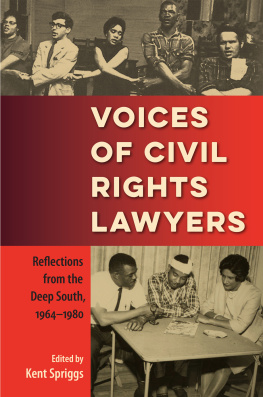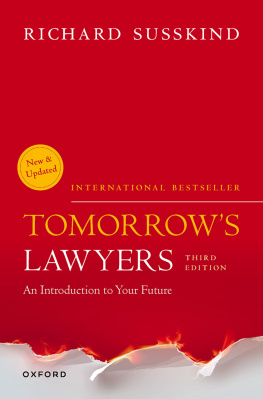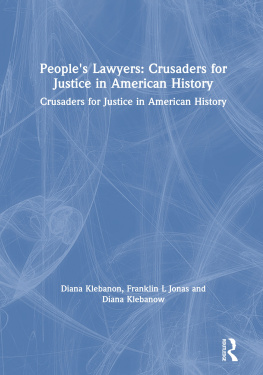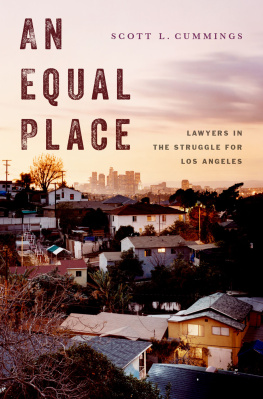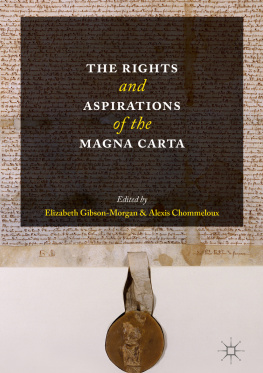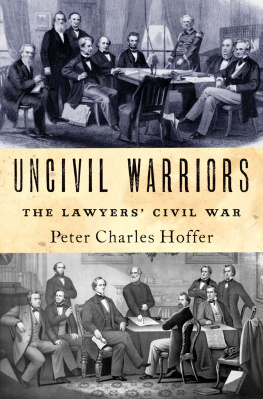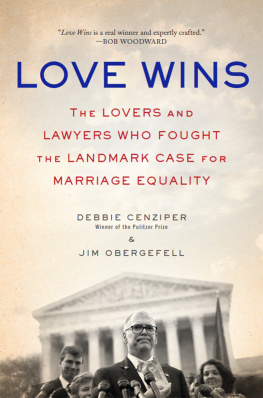
VOICES OF CIVIL RIGHTS LAWYERS

UNIVERSITY PRESS OF FLORIDA
Florida A&M University, Tallahassee
Florida Atlantic University, Boca Raton
Florida Gulf Coast University, Ft. Myers
Florida International University, Miami
Florida State University, Tallahassee
New College of Florida, Sarasota
University of Central Florida, Orlando
University of Florida, Gainesville
University of North Florida, Jacksonville
University of South Florida, Tampa
University of West Florida, Pensacola
VOICES OF CIVIL RIGHTS LAWYERS
Reflections from the Deep South, 19641980
Edited by Kent Spriggs
Foreword by Marian Wright Edelman
University Press of Florida
Gainesville Tallahassee Tampa Boca Raton
Pensacola Orlando Miami Jacksonville Ft. Myers Sarasota
Fred Grays essays The Making of a Lawyer and Selma Once More: The 1965 Selma March are adapted from Bus Ride to Justice by Fred D. Gray (1995, 2013, NewSouth Books), reprinted with the permission of the publisher. For more information, see NewSouth Books at www.newsouthbooks.com.
Solomon Seays essay Solomon Seay Seeks Public Accommodation is adapted from Jim Crow and Me: Stories from My Life as a Civil Rights Lawyer by Solomon S. Seay Jr. with Delores R. Boyd (2008, NewSouth Books), reprinted with permission of the publisher. For more information, see NewSouth Books at www.newsouthbooks.com.
Copyright 2017 by Kent Spriggs
All rights reserved
Printed in the United States of America on acid-free paper
22 21 20 19 18 17 6 5 4 3 2 1
Library of Congress Cataloging-in-Publication Data
Names: Spriggs, Kent, editor of compilation. | Edelman, Marian Wright, author of foreword.
Title: Voices of civil rights lawyers : reflections from the deep South, 19641980 / edited by Kent Spriggs ; foreword by Marian Wright Edelman.
Description: Gainesville : University Press of Florida, 2017. | Includes bibliographical references and index.
Identifiers: LCCN 2017005522 | ISBN 9780813054322 (cloth : acid-free paper)
Subjects: LCSH: African AmericansCivil rightsSouthern StatesHistory20th century. | Civil rights movementsSouthern StatesHistory20th century. | LawyersSouthern StatesHistory20th century. | African American lawyersSouthern StatesHistory20th century. | Civil rights workersSouthern StatesHistory20th century. | African American civil rights workersSouthern StatesHistory20th century.
Classification: LCC E185.615 .V63 2017 | DDC 323.1196/0730750904dc23
LC record available at https://lccn.loc.gov/2017005522
The University Press of Florida is the scholarly publishing agency for the State University System of Florida, comprising Florida A&M University, Florida Atlantic University, Florida Gulf Coast University, Florida International University, Florida State University, New College of Florida, University of Central Florida, University of Florida, University of North Florida, University of South Florida, and University of West Florida.

| University Press of Florida 15 Northwest 15th Street Gainesville, FL 32611-2079 http://upress.ufl.edu |
Contents
Fred Gray
Barbara Phillips
Jack Drake
Laughlin McDonald
Larry Menefee
Armand Derfner
John C. Brittain
David Lipman
Mac Farmer
.
Kent Spriggs
Fred Gray
Larry Aschenbrenner
Larry Aschenbrenner and Armand Derfner
Reber Boult
Armand Derfner
Norman Siegel
Larry Aschenbrenner
Larry Aschenbrenner
Barbara Lipman
Jim Lewis
Dennis Roberts
Bill Ferguson
Kent Spriggs
Larry Aschenbrenner
Henry Aronson
Kent Spriggs
Elliott C. Lichtman
Armand Derfner
John C. Brittain
Armand Derfner
Mac Farmer
Kent Spriggs
.
Richard Sobol
Henry Aronson
David Lipman
Constance Slaughter-Harvey
Fred Banks
Richard Sobol
Mac Farmer
Armand Derfner
Larry Aschenbrenner
Larry Menefee
Jack Drake
Armand Derfner
Richard Sobol
Fred Banks
Laughlin McDonald
Larry Menefee
Larry Aschenbrenner
David Lipman
Solomon Seay
Don Marmaduke
Richard Tuttle
Richard Sobol
Larry Aschenbrenner
Henry Aronson
John Maxey
David Lipman
Fred Banks
Kent Spriggs
Richard Sobol
Kent Spriggs
Kent Spriggs
Jack Drake
David Lipman
Barbara Phillips
Mac Farmer
Barbara Phillips
Larry Menefee
Figures
.
.
Foreword
MARIAN WRIGHT EDELMAN
Im so grateful for this inspiring book and the stories captured heremost from old friendsabout a moment when practicing law helped change the world.
Law school never crossed my mind until my senior year at Spelman College when I was arrested for sitting in to desegregate Atlantas City Hall cafeteria and began volunteering at the Atlanta NAACP. After sorting requests for legal assistance from poor black citizens who sought to challenge racially discriminatory policies, cases white lawyers would not touch, I realized that going into the Foreign Service was misguided when the freedom and justice struggle was here at home. I entered Yale Law School in September 1960 thinking law was the best tool to fight racial discrimination.
I hated law school, but I had a mission and Mississippi on my mind. Many of my college friends with whom I had gathered at Ella Bakers urging and Dr. Kings invitation to form the Student Nonviolent Coordinating Committee (SNCC) had gone to Mississippi and other southern states to begin the dangerous task of registering black voters. I couldnt figure out what corporations, property, and future courses had to do with civil rights struggles, so I traveled to Mississippi during spring break 1961 to remind myself why I was in New Haven studying law while SNCC friends were on the front lines in Greenwood. I found my answer. There were about 900,000 black citizens in Mississippis closed society and only four black lawyers. Only three took civil rights cases: R. Jess Brown, Carsie Hall, and Jack Young, who later took me under their wings and taught me how to survive. None had gone to a formal law school. Graduates of Ole Miss Law Schoolclosed to blackswere automatically admitted to the Mississippi Bar.
Medgar Evers, the local head of the NAACP, was the first welcoming face I saw at the Jackson airport where he picked me up. He took me home to have dinner with Myrlie and their children, and then drove me up to Greenwood in the Mississippi Delta where the SNCC headquarters was located about ninety miles away. Our first news on arrival was about a shooting that day that had terrorized the black community. After debriefing with my hosts, Medgar drove ninety miles at night back to Jackson.
Next page
